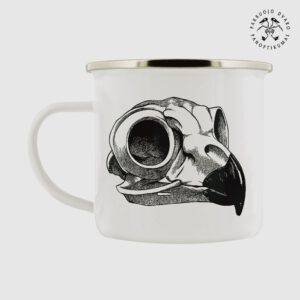
Choeros. Genuine Pig Skull Element
59.00 €
On linen. Wooden Frame.
18x32cm
Neturime
Aprašymas
Entelodonts had huge heads, ornamented with distinctive bony expansions. The zygomatic arches (cheekbones) develop huge jugal flanges which project downwards and outwards. Moreover, the underside of the lower jaw typically has one or two pairs of knob-like mandibular tubercles. These are not always diagnostic to specific taxa: often the size and presence of tubercles is variable within a single species.
The snout was narrow and elongated, especially in later species. The cranium was robust, with strong zygomatic and postorbital arches forming the rim of voluminous temporal fossae, separated by a sharp sagittal crest. However, the rear of the skull was also much shorter than the snout, and the braincase was relatively small. Most of the braincase contributed to large paranasal sinuses and olfactory bulbs at the front, while the cerebrum was underdeveloped. Large olfactory bulbs are likely indicative of a good sense of smell. Moreover, the orbits (eye sockets) are oriented further forwards than in most artiodactyls, suggesting that entelodonts had binocular vision. Compared to other artiodactyls, the jaw was slender at the rear, with a short, triangular coronoid process which is shifted forwards. The mandibular condyle (jaw joint) is set back and below the level of the tooth row. The mandibular symphysis (chin) was fused, and the pterygoid bones along the middle of the roof of the mouth were connected by a strong interdigitating suture.
Norėdami parašyti atsiliepimą, turite prisijungti.




Atsiliepimai
Atsiliepimų dar nėra.